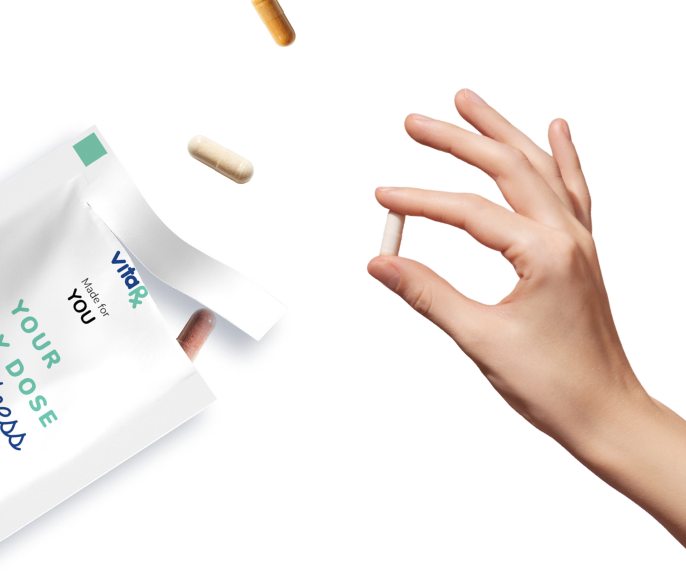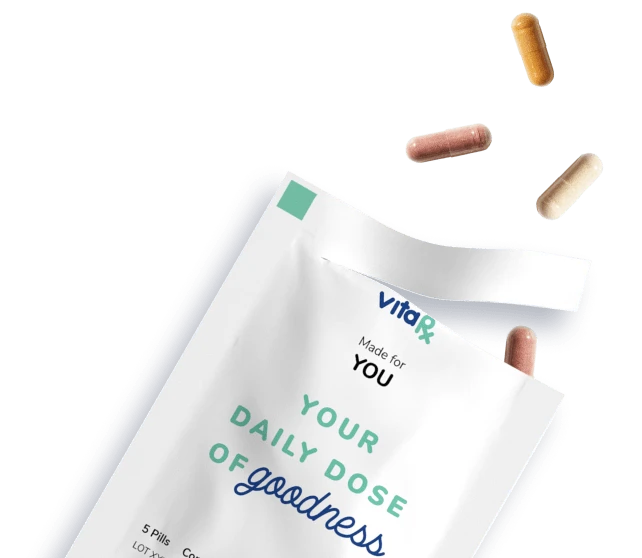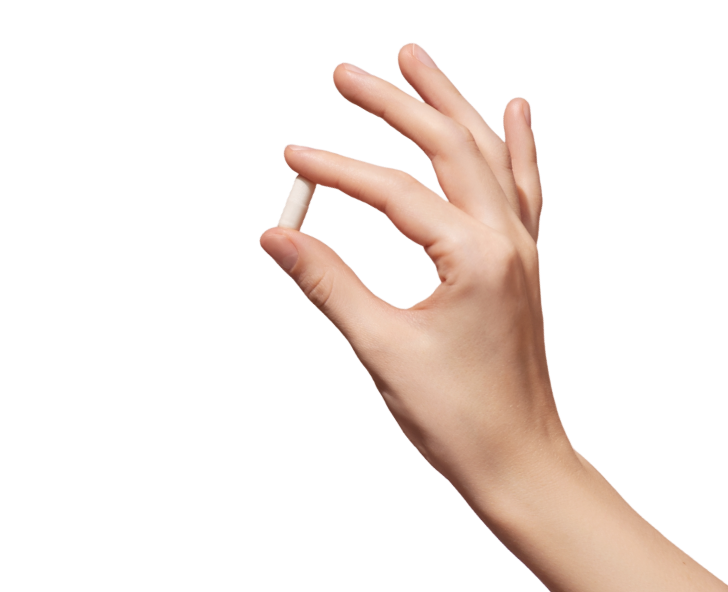Last update: January 20, 2025
6 minute read
What is Beta-carotene?
Discover the benefits of beta-carotene, food sources, and how to add it to your diet. Learn about the connection between VitaRx supplements and a healthier lifestyle.

By Derick Rodriguez, Associate Editor
Edited by Dr. Dimitar Marinov, MD, RDN, PhD

Ever wondered what's behind the bright orange hue of carrots and sweet potatoes? It's Beta-carotene, a great nutrient that's a solid choice for your overall health.
What's the scoop on beta-carotene, and why should you care? It's time to learn about this dynamic nutrient that's making your fruits and veggies look so tempting. By the end of this post, you'll know how it works, where to find it, any potential side effects, and how to add it to your daily life.
Key takeaways
- Beta-carotene is a precursor to vitamin A and a powerful antioxidant
- It supports healthy skin, eyes, and immune function
- Foods rich in beta-carotene include carrots, sweet potatoes, and leafy greens
What is beta-carotene, and why should you care?
Beta-carotene is a powerful antioxidant, and it's the plant-based precursor to vitamin A, which means your body converts it into vitamin A as needed. It plays a key role in supporting your immune system, eye health, and maintaining glowing skin.
One example of beta-carotene's benefits is its ability to protect your eyes from age-related macular degeneration (AMD) - a leading cause of vision loss in older adults. Research has shown that a diet high in beta-carotene may decrease the risk of developing AMD by up to 25%.

How does beta-carotene work in your body?
When you consume beta-carotene-rich foods, your body converts this plant-based nutrient into vitamin A as needed, which is a total multitasker when it comes to keeping us healthy. This conversion process involves enzymes in the intestines and liver that convert beta-carotene into retinol, the active form of vitamin A. Retinol is then transported to various tissues and organs, where it works its magic.
For instance, vitamin A is essential for maintaining good vision, particularly in low-light conditions. It achieves this by helping to produce the light-sensitive pigment in your retinas called rhodopsin, which allows your eyes to absorb light and perceive images.
Plus, beta-carotene, as an antioxidant, helps neutralize harmful free radicals that can cause cellular damage, which may contribute to aging and various chronic diseases. It also plays a vital role in keeping the immune system in tip-top shape by promoting the growth and function of immune cells.
A classic example of beta-carotene in action is eating carrots to support night vision. While munching on carrots alone won't give you superhero-like night vision, the beta-carotene in them does contribute to maintaining good eye health and supporting blindness caused by vitamin A deficiency.
VitaRx Tip
Add beta-carotene-rich foods like carrots and spinach to your diet to support vision health and boost your immune system.
Where can you find the best beta-carotene-rich foods?
It's time to paint your plate with vibrant beta-carotene-rich foods! Luckily, these nutrient powerhouses are easy to spot, as they're often found in brightly colored fruits and vegetables, particularly those with red, orange, and yellow hues.
Some green leafy vegetables also contain beta-carotene, but it's masked by the chlorophyll. Here's a list of some top-notch beta-carotene sources to help you get your daily dose.
- Carrots: The poster child of beta-carotene, these crunchy treats are a versatile and delicious way to add some color to your meals.
- Sweet potatoes: These nutrient-dense tubers are not only rich in beta-carotene but also packed with fiber and other essential nutrients.
- Spinach: Popeye's go-to green is full of beta-carotene, iron, and other vitamins, making it a fantastic addition to salads, smoothies, or cooked dishes.
- Apricots: These sweet and juicy fruits are perfect for a beta-carotene boost on the go or as a tasty addition to your morning oatmeal.
- Pumpkin: This autumn favorite isn't just for decorating your porch; it's also an excellent source of beta-carotene and can be used in both sweet and savory dishes.
VitaRx Tip
Remember, it's essential to include a variety of these colorful foods in your diet to get the most benefits from beta-carotene and the other nutrients they provide.
Can you consume too much beta-carotene?
While beta-carotene is generally considered safe, there are a few things to keep in mind. First, consuming large amounts of beta-carotene might cause your skin to turn slightly yellow-orange, a harmless condition called carotenemia.
Don't worry, though – it's reversible, and your skin color will return to normal once you reduce your beta-carotene intake. For smokers or those with a history of asbestos exposure, high-dose beta-carotene supplements may increase the risk of lung cancer, according to some studies (source: Journal of the National Cancer Institute).
It's important to note that these risks are associated with supplements, not the beta-carotene found naturally in foods. If you fall into this category, it's best to consult your healthcare provider before taking any beta-carotene supplements.
Top 5 beta-carotene-rich foods and their content
The list below showcases the top 5 beta-carotene-rich foods and their respective beta-carotene content per 100 grams. This handy reference will help you quickly identify the most potent sources of this essential nutrient to add to your diet.
Food | Beta-carotene (mcg) per 100g |
|---|---|
Carrots | 8,285 |
Sweet Potatoes | 7,048 |
Spinach | 5,626 |
Apricots | 1,635 |
Pumpkin | 3,100 |
Beta-carotene content of top 5 foods
Advantages and disadvantages of taking
As with most things in life, there are pros and cons to consuming beta-carotene.
Frequently asked questions (FAQ)
Here are some of the most frequently asked questions about beta-carotene.
Final thoughts
Remember to embrace those colorful fruits and veggies, and don't forget to consider adding complementary supplements from VitaRx to support your health and wellness goals. Stay vibrant and healthy!
Source
- A Randomized, Placebo-Controlled, Clinical Trial of High-Dose Supplementation With Vitamins C and E, Beta Carotene, and Zinc for Age-Related Macular Degeneration and Vision Loss
- The Role of Vitamin A in Retinal Diseases - PMC
- Role of Beta-Carotene in Lung Cancer Primary Chemoprevention: A Systematic Review with Meta-Analysis and Meta-Regression
Editor

Derick Rodriguez
Derick Rodriguez focuses on editing health and wellness-related content. With over half a decade of experience in the digital realm, Derick has developed a unique skill set that bridges the gap between complex health concepts and accessible, user-friendly communication. His approach is deeply rooted in leveraging personal experiences and insights to illuminate the nuances of health and wellness topics, making them more approachable and empowering readers with knowledge and confidence.
Fact checker

Dr. Dimitar Marinov
Dr. Marinov has years of experience in scientific research and preventive and clinical medicine. His publications in peer-reviewed journals are on nutritional status, physical activity, and musculoskeletal disorders among adolescents.
At VitaRx, we're not just passionate about our work — we take immense pride in it. Our dedicated team of writers diligently follows strict editorial standards, ensuring that every piece of content we publish is accurate, current, and highly valuable. We don't just strive for quality; we aim for excellence.
Related posts
While you're at it, here are some other relevant articles you might be interested in.

Get your personalized vitamin recommendations in less than
5 minutes.
Get your personalized vitamin recommendations in less than
5 minutes.







